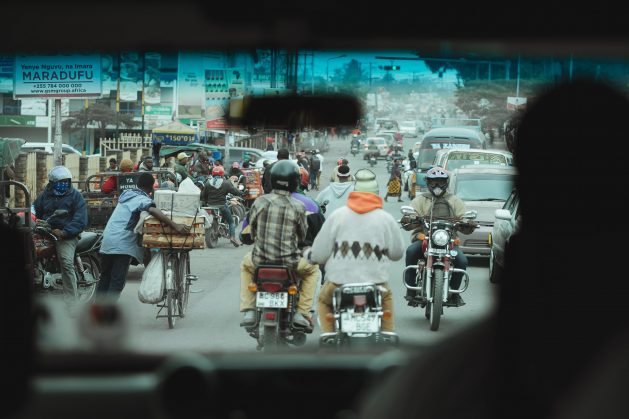
Asia-Pacific, Civil Society, Conservation, Development & Aid, Environment, Featured, Headlines, Natural Resources, Sustainability, Sustainable Development Goals, TerraViva United Nations

Female workers sort out plastic bottles for recycling in a factory in Dhaka, Bangladesh. Credit: Abir Abdullah/Climate Visuals Countdown
– After Bangladesh’s interim government banned polyethene bags, a new sense of hope has emerged for the Sonali bag—a jute-based, eco-friendly alternative developed in 2017 by Bangladeshi scientist Dr. Mubarak Ahmed Khan. Sonali bag, or the golden bag, is named after the golden fiber of jute from which it is made.
Despite its promises, the project has struggled to make significant progress due to a lack of funding. However, following the announcement of the polythene bag ban, Mubarak is now facing pressure to supply his Sonali bag to a market eager for sustainable alternatives.
“Since the government banned polythene bags, we have faced immense pressure of orders that we cannot meet—people are coming in with requests at an overwhelming rate,” Mubarak Ahmed Khan told the IPS.
The latest ban, which came into effect on October 1 for superstores and traditional markets on November 1, isn’t the first time Bangladesh has imposed a ban on polythene bags.
In 2002, the country became the first in the world to outlaw them, as plastic waste was severely clogging city drainage systems and exacerbating its waterlogging crisis, with Dhaka alone consuming an estimated 410 million polybags each month. But the ban gradually lost effectiveness over the years, largely due to a lack of affordable and practical alternatives and inadequate enforcement from regulatory authorities.

Dr. Mubarak Ahmed Khan in his office holding a Sonali Bag. Credit: Masum Billah/IPS
Polyethene bags, although cheaper, are harmful to the environment as they are non-biodegradable and their decomposition takes at least 400 years. Sonali Bag as an alternative, on the other hand, is regarded as a game-changer because it is biodegradable, capable of decomposing in three months.
The ban comes as the UN Plastics Treaty Negotiations are underway in Busan, South Korea. The UN Environment Programme estimates that around the world, one million plastic bottles are purchased every minute.
“In total, half of all plastic produced is designed for single-use purposes—used just once and then thrown away.”
Without an agreement, the OECD estimates that annual plastic production, use, and waste are predicted to increase by 70 percent in 2040 compared to 2020. This on a planet already choking on plastic waste.
The talks have in the past stalled over a disagreement over how to manage waste, with some countries favouring introducing a cap on plastic production and others supporting circularity with use, reuse, and recycling as the main objectives.
The plastics treaty talks will run from 25 November 2024 to 1 December 2024.
However, despite its environmental benefits and higher demands, in Bangladesh the Sonali Bag project still remains within the pilot phase.
A late start for funding crisis
After Mubarak’s invention made headlines, the country’s state-owned Bangladesh Jute Mills Corporation launched a pilot project, setting up a jute-polymer unit at the Latif Bawani Jute Mill to produce Sonali Bag.
Mubarak said they have been asking for government funds, as the project has been operating under the Ministry of Textiles and Jute. However, the basic funding that kept the pilot project running expired last December, and the previous government—which was toppled in August in a mass uprising—had discontinued the project.
“There had been assurances that we might receive Tk100 crore (about USD 8 million) in funding from the government by July. But then came political unrest and a change in government,” Mubarak said.
After the new government took charge, they renewed the pledges to fund the Sonali Bag project.
“The interim government told us that we will get the money in January. If that happens, we will be able to produce five tons of bags per day,” Mubarak said. “Five tons may not be a lot, but it will give us the chance to demonstrate our work to private investors, boosting their confidence to engage with us.”
According to Mubarak, one kilogram of Sonali bags amounts to around 100 pieces of small bags. Based on this estimate, five tons could produce around 15 million bags per month.
Bangladesh’s current adviser to the Ministry of Textiles and Jute, Md. Sakhawat Hossain, told IPS that they are seriously considering funding the Sonali Bag project this January, although he acknowledged that his ministry is currently facing a funding crisis.
“The work will begin in full scale after the fund is provided,” Sakhawat Hossain said. When asked if Mubarak would receive the funds by January, he replied, “We hope so.”
A ban without adequate alternatives at hand
Mubarak Ahmed Khan regards the government’s decision to ban polythene bags as a “praiseworthy” initiative. However, he emphasized that sustainable and affordable alternatives to the polythene bags should come soon.
Mubarak is not alone in his concerns. Sharif Jamil, founder of Waterkeepers Bangladesh, an organization dedicated to protecting water bodies, shares skepticism about the effectiveness of the ban this time, citing the lack of sustainable alternatives in the market.
“The announcement of this ban is an important and timely step. However, it must also be noted that our previous ban was not enforced. Without addressing the underlying issues that led to nonenforcement of the previous ban, the new polythene ban will not resolve the existing problems. It is crucial to tackle the challenges that allowed polythene to remain in the market,” Sharif Jamil told IPS.
“If you don’t provide people with an alternative and simply remove polythene from the markets, the ban won’t be effective,” he added.
Sharif noted that the existing alternatives in the market are not affordable, with some selling alternative jute bags at Tk25 in supermarkets, while polythene bags are often offered at a price that is essentially free.
“Alternatives need to be more affordable and accessible to the public,” he said.
Mubarak stated that his Sonali bag currently costs Tk10 per piece, but he anticipates lowering the price with increased production and demand.
The pursuit of competition in sustainable alternatives
Sharif Jamil, however, wants competition in the sustainable alternatives market.
“It is not only about incentivizing Dr. Mubarak’s project,” Sharif said.
This technology has to be incentivized and recognized, but the government also has to ensure two other things, he said.
“If the government can make it accessible to people at a lower price, it will reach them. Secondly, if the alternative remains solely with Mubarak, it will create a monopoly again,” he said.
It must undergo competition, he recommended. Bangladesh has a competition commission to ensure that other existing sustainable green solutions on the market are also incentivized and recognized.
“Besides facilitating and upgrading Mubarak’s project, the government should ensure fair competition so that people can access it at a lower price,” he added.
For the sake of environment
Adviser Shakhawat Hossain said that they are optimistic about the success of Sonali Bag.
“Already the ambassadors of various countries are meeting me about this. Some buying houses too have been created for this. It seems it will be a sustainable development,” he said.
Mubarak said that if they get the funding soon, Sonali Bag will have a market not only in Bangladesh but all over the world.
He said the private investors should come forward not just because the government has banned polythene bags, but out of a moral obligation to address the negative impact these bags have on the environment.
“With this, I believe we can create a polythene-free environment,” Mubarak said, acknowledging, “It is not easy to introduce this to the market solely because it is a new product. We are up against an USD 3.5 trillion single-use plastic market.”
IPS UN Bureau Report



